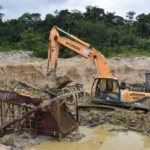
The Ghana Institute of Foresters (GIF) is calling for the immediate resumption of burning excavators and other mining equipment found in forest reserves, insisting that the measure remains the most effective deterrent against illegal mining.
The call was made by GIF National President, Dr Abukari Nantogmah Attah, during the Institute’s 28th Annual General Meeting (AGM) held on 6 November 2025 at KNUST.
Dr Attah said the current practice of seizing excavators, as directed by the President earlier this year, has proved ineffective. He argued that illegal miners often flee after removing key machine parts, making evacuation of the equipment difficult and allowing some of the seized machinery to “find their way back” into the forests.
“There is an urgent need to resume the destruction (burning) of excavators and other mining equipment found operating in forest reserves. The forest sector laws allow this. It is the strategy that deters most illegal miners,” he stated.
The AGM, held on the theme “Foresters at the Forefront of Change: Tackling Mining Challenges and Advancing Forest Restoration,” brought together about 150 members, including the Pro Vice-Chancellor of KNUST, Prof. David Asamoah, and the Chief Executive of the Forestry Commission, Dr. Hugh Brown, who delivered the keynote address.
Presentations showed alarming levels of forest degradation linked to illegal mining. Spatial analysis between 2015 and 2024 revealed a sharp decline in Ghana’s closed forests, while open forests increased—signalling widespread degradation rather than outright deforestation.
Fifty protected reserves have already been affected by mining, with nine forest reserves overtaken by armed miners at the start of 2025. By October, five remained under the control of such groups. Some foresters have been killed or severely injured while attempting to stop the illegal activity.
GIF also bemoaned the low prosecution rate despite intensified operations. Out of 1,190 illegal miners arrested between 2023 and October 2025, only 35 have been successfully prosecuted.
The Institute commended the government’s renewed action against illegal mining, including the revocation of nearly 300 small-scale mining licences and the introduction of a Legislative Instrument to repeal L.I. 2462 and L.I. 2501, laws that had permitted mining in certain forest reserves.
GIF recommended that the new legal framework should allow only restricted deep-cast mining in designated production forests under strict monitoring, and completely ban all surface and alluvial mining in forest reserves due to their destructive impact on water bodies and biodiversity.
The foresters also called for intensified public education, urging the National Commission for Civic Education (NCCE) to treat galamsey sensitisation as a national emergency.
They condemned the recent attack on the National Anti-Illegal Mining Operations Secretariat at Hwidiem, which resulted in the release of arrested miners, and backed ongoing proposals to transform the Forestry Commission into a paramilitary institution capable of confronting armed mining groups.
“Let us not normalise the abnormal. Nothing can justify the destruction of our forests and water bodies,” the statement added, urging Ghanaians not to “look on as a minority destroys the nation’s natural heritage for private gain.”
The resolution, issued in Kumasi on 14 November 2025, reflects the Institute’s commitment to collaborating with all stakeholders to promote sustainable mining and restore Ghana’s degraded forests.